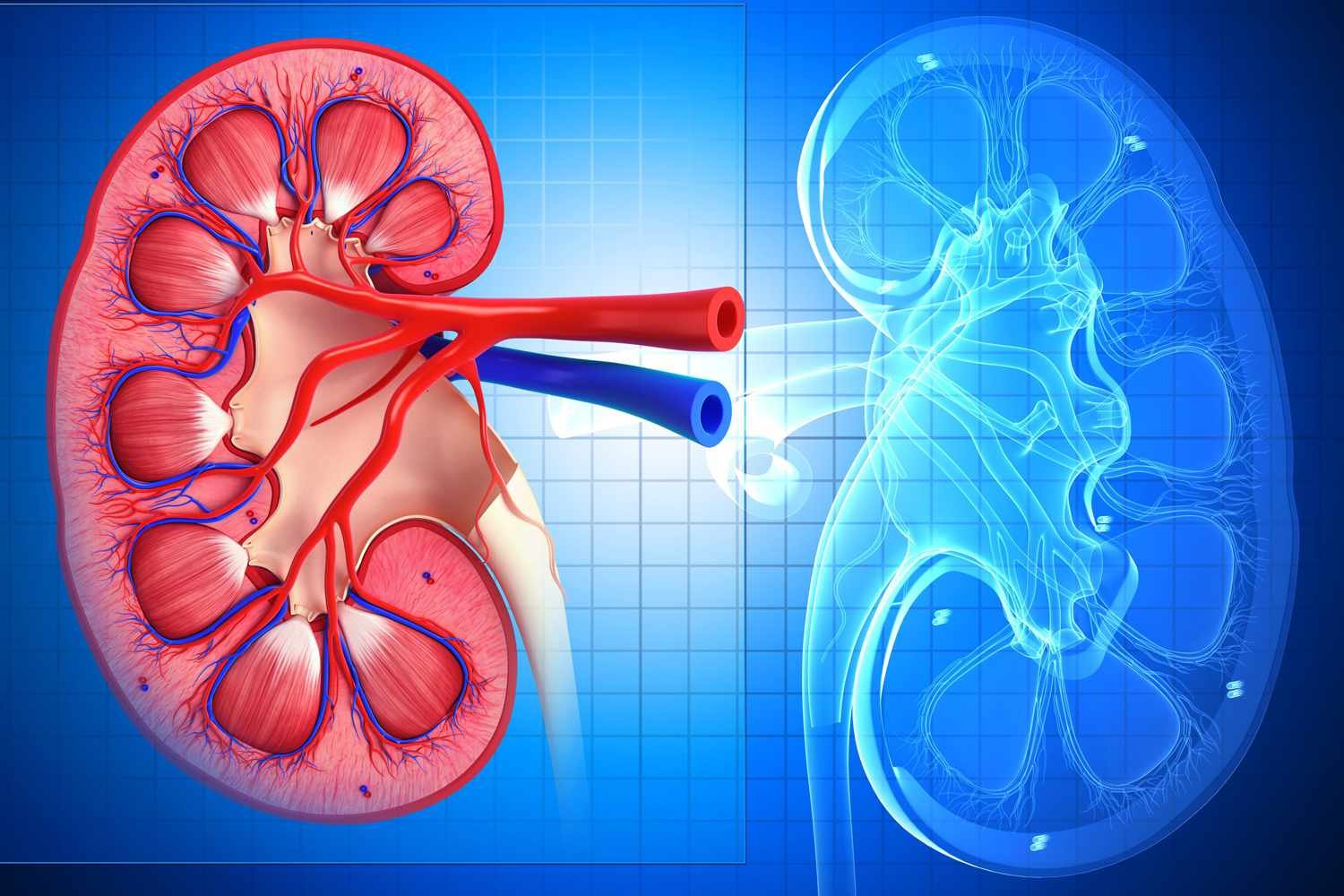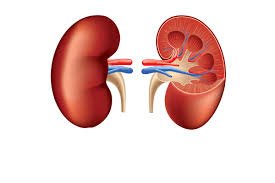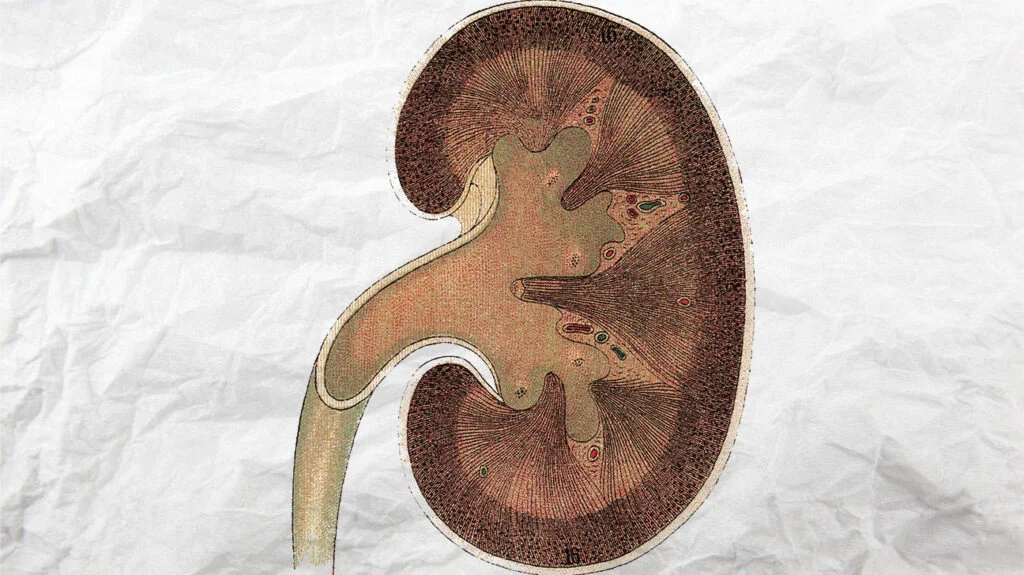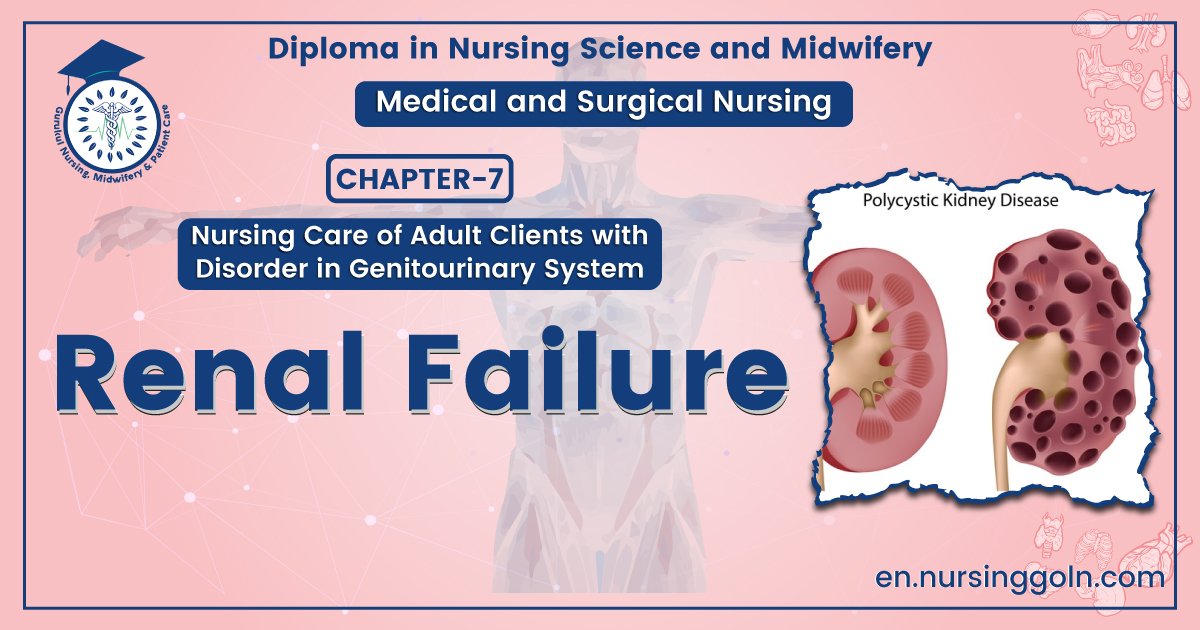Renal Failure – This course is designed to understand the concept of community health nursing: nurses’ roles and interventions in family health, school health, occupational health, environmental health, elderly health care, gender issues, disaster management and principles and terminology of epidemiology. The aim of the course is to acquire knowledge and skills in community health nursing.
Renal Failure
Definition of Renal Failure:
Renal failure may be defined as Failure to renal excretion leading to retention of nitrogenous waste products of metabolism including creatinine & urea
Or,
Kidney failure, also known as renal failure or renal insufficiency, is a medical condition of impaired kidney function in which the kidneys fail to adequately filter metabolic wastes from the blood.
Types of Renal Failure:
Kidney failure can be divided into two categories:
1. Acute Kidney Injury
2. Chronic Kidney Disease.
A. Acute kidney injury/acute renal failure:
Acute kidney injury (AKI), previously called acute renal failure (ARF), is a rapidly progressive loss of renal function, generally characterized by oliguria (decreased urine production, quantified as less than 400 mL per day in adults, less than 0.5 mL/kg/h in children or less than 1 mL/kg/h in infants); and fluid and electrolyte imbalance
B. Chronic kidney disease:
Chronic kidney disease (CKD) can also develop slowly and, initially, show few symptoms. CKD can be the long term consequence of irreversible acute disease or part of a disease progression

Definition of ARF:
ARF is characterized by an acute and usually reversible deterioration of renal function, which develops over a period of days or weeks and results in uraemia.
OR-
A significant deterioration of renal function occurring over hours or days, detected by a rising urea and creatinine, with or without oligura.
Classification/Causes of Renal Failure/ARF:
A) Pre-renal ARF:
a) Reduced circulatory blood volume (hypovolumia)
➤ Haemorrhage from any causes:
- GIT bleeding (Haematemesis, melaena)
- Postpartum haemorrhage
- During surgery
- Trauma: Fracture of pelvis/ femur
➤ Loss of plasma as in burn and crushing injuries
➤ Sodium and water depletion:
- From GIT: Severe vomiting, Diarrhea, Acute intestinal obstruction pancreatitis, Paralytic ileus, Fistulae
- In urine: Due to diuretics, diabetic ketoacidosis.
- From skin: due to excess sweating
b) Reduction in cardiac output:
➤ Myocardial infarction
➤ Cardiac temponade
➤ Vascular pooling as in anaphylaxis, sepsis
e) Intravascular haemolysis
d) Rhabdomyolysis
e) Bilateral renal vessel occlusion (thrombosis, embolism)
B) Renal ARF:
- Glomerulonephritis: Acute glomerulonephritis
- Pyelonephritis:
✓ Acute pyelonephritis
✔ Chronic pyelonephritis
Vascular:
✓ Vasculitis
✓ Renal arteriolar hypertension
✔ Malignant hypertension
- Tubular cells injury:
✓ Ischemia
✔Toxins: eg, aminoglycosides, sulphonamides
- Intra-luminal obstruction:
✓ Precipitation of crystal
✓ Precipitation of protein-amyeloidosis
- Interstitial nephritis: Diffuse infections, Hypercalcaemia, drug
- Others: Polycystic kidneys, renal tuberculosis, PAN
C) Post renal ARF:
- Extra renal obstruction:
✔ Prostatic enlargement
✔ Urethral stricture
✓ Tumour of prostate, pelvis, urinary bladder
✔ Calculi or blood clots
✓ Surgical accident
- Intra renal obstruction:
✓ Crystal of uric acid
✓ Crustal of oxalic acid
- Bladder-rupture/trauma.

Clinical Features:
- Oliguric phase:
a) Urine volume markedly decrease to 200-250 ml/day
b) After some days symptoms of uremia develop:
- Initially anorexia
- Nausea
- Vomiting
- Apathy
- Mental
- Confusion
- Later muscular twitching
- Fits
- Drowsiness coma and bleeding episodes
- Respiratory rate is often increased due to acidosis, respiratory infection
Danger of oliguria:
- Pulmonary oedema
- Hyperkalemia
- Anaemia
- Chance of systemic infection is more
- Uremia and metabolic acidosis
- Renal cortical necrosis
- Recovery phase:
a) After 7-20 days renal function returns
b) In a number of patients a diuretic phase develops!
- Urine output is frequently 35 liters/days
- Usually persists for 3-5 days
Danger of diuretic phase:
- Infection
- Electrolyte imbalance, eg. Hypokalemia
Investigations of ARI:
- Urine for RME, C/S: Volume reduced, increased specific gravity, pus cell, RBC cast may present.
- Blood: FBC, Platelet count, blood film, blood culture
- Blood urea, serum creatinine raised
- Serum electrolytes: Hyperkalaemia, hyponatraemia, metabolic acidosis
- X-ray of KUB region, Chest X-ray
- Ultrasonography of KUB region
- Intravenous urology
- Renal biopsy
Nursing Management of ARF
A. Emergency resuscitative measure:
- Hyperkalaemia: Calciumgluconate 10 ml 10% IV, infusion of 25% glucose and if hyperglycaemia insulin (12 unit IV)
- Acidosis: 10% NaHCO3
B.General management:
- Fluid and electrolyte balance: Fluid requirement is 500 ml plus previous day output.
- Nutrition: Restriction of protein to about 40 g/day (0.5-1 gm/kg/day in children) and adequate calorie.
- Control of symptoms: If infection, antibiotic, hypertension; antihypertensive.
C. Management of oliguric phase:
- Restriction of movement (absolute bed rest)
- Restriction of fluid (previous day output + 500 ml)
- Restriction of protein (about 40 mg/day)
- No restriction of carbohydrate or fat
- Restriction of fruits (especially K* fruit)
- Restriction of salts
- If patient’s condition is deteriorating, go for peritoneal dialysis or haemodialysis
D. Management of diuretic phase:
- Adequate amount of fluid orally or parenterally to replace 3-5 liters of urine that is produced daily.
- Adequate maintenance of electrolytes balance with serum electrolytes estimation daily
- Restriction of protein
- Strict control of infection should be maintained
- Haemodialysis or peritoneal dialysis (if indicated)
E. Infection control: by antibiotic
F, Drugs: NSAIDs and ACE inhibitors should be avoided

Complication of ARF:
- Oedima
- Electrolytes imbalance: Hyperkalaemia, hyponatraemia.
- Acid base imbalance: Metabolic acidosis
- Hyperuricemia
- Infections
- Undergo chronic renal failure (CRF)
- Bleeding manifestations
- Cardiac:
- Uraemic pericarditis
- Cardiac arrhythmias
- Hypertension
